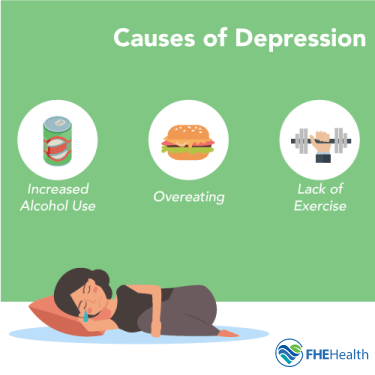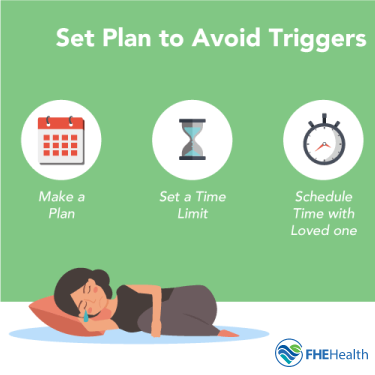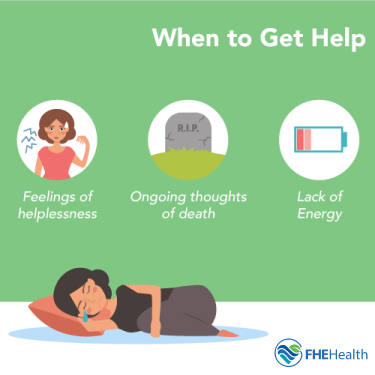
For many people, the holidays are a time of fun and family at the end of a long year. From giving thanks and enjoying a great meal at Thanksgiving to exchanging presents with friends and family members at Christmas or Hanukkah, there’s a lot to look forward to during the winter holiday season.
However, not everyone finds these months to be a holly, jolly time. Many are left wondering, “Why do holidays make me sad?” In fact, depression peaks in the winter months, when temperatures drop and family obligations heighten. Around 4%–6% of people have seasonal affective disorder, while an additional 10%–20% have a milder form of seasonal depression. Even after the weather warms, over 16 million Americans live with major depressive disorder.
For many, surviving another holiday season is part of working through mental health struggles. But holiday depression isn’t necessarily benign or a symptom of the winter weather, and it may be a cause for concern. If your sadness during the holiday season leads to suicidal thoughts or tendencies, it’s crucial to seek help.
Holiday Depression or Holiday Blues?
“The holidays make me sad,” you’ve realized — but why? Not all feelings of sadness or negativity are a result of clinical depression. The holiday blues often have comparable symptoms, such as feeling fatigued, lonely or frustrated. If these feelings come and go, particularly with moments of heightened stress and holiday expectations, holiday depression is a likely culprit.
However, if these feelings are more consistent and last for 2 weeks or more, you may want to speak with your doctor about the signs of major depressive disorder.
Causes of Holiday Depression
 Depression during the holidays can be attributed to everything that comes with the holiday season. While the cause will be different for everyone and vary based on past experiences, personal feelings and life circumstances, some events are more influential than others.
Depression during the holidays can be attributed to everything that comes with the holiday season. While the cause will be different for everyone and vary based on past experiences, personal feelings and life circumstances, some events are more influential than others.
While by no means an exhaustive list, the following elements can often contribute to or worsen holiday depression:
- Weather and time changes. When the average weather outside shifts from warm and sunny to cold and rainy or snowy, it’s not uncommon for moods to change. The time change in the fall for Daylight Savings has proven clinical ties to SAD and depression.
- Increased alcohol use. Around the holidays, parties and social gatherings are more frequent, which can result in increased alcohol use. There’s a strong correlation between alcohol use and depression, and while intoxication can feel temporarily beneficial, drinking heavily can be a downward spiral for those with mood and anxiety disorders.
- Overeating. Overeating is common around the holidays, with days like Thanksgiving glorifying eating large meals. However, for those struggling with body image, overeating can bring up negative feelings and compromise efforts to build self-esteem.
- Overspending. The holiday season often comes with increased expenses, like dinners out, parties and pricey presents. For those on a tight budget, it’s not uncommon for expected expenses to lead to anxiety or depression.
- Lack of sleep. Over the holidays, social events escalate, leading to parties that last late into the night. While it’s common to take vacation time around the holidays, most Americans don’t have enough paid time off to take several weeks off at a time, leading to late nights and early mornings. Sleep, depression and anxiety are all connected, and poor sleep can lead to worsening side effects.
- Prolonged time with family. Time with family isn’t always a good thing. For those with challenging relationships with parents, siblings or children, those going through a divorce and those who’ve just experienced loss, the holidays may bring up feelings of sadness and regret. People dealing with mental health struggles may find themselves facing holiday depression when all of the negative feelings piled on.
- Lack of exercise. With busier schedules and colder temperatures, it’s not as easy to find time to stay healthy. When coupled with overeating and over-imbibing, there’s a clear correlation with depressive feelings. While exercise isn’t a cure-all, it can have ameliorating effects on depression, so letting a routine lapse can around the holidays can have particularly negative consequences.
- No time for self-care. An increase in plans can mean less time for things like exercise, but it can also mean less time for self-care. For those who face depression, self-care can be critically important to promoting good mental health. Losing out on this time may not seem so important, but without adequate room to rest and recharge, the weight of the holidays can become crippling.
While one change to a routine can be a lot to handle, weeks or even months of changes can be devastating. With so many adjustments and social situations on the horizon, it’s not surprising that many people face holiday depression, with rates spiking in the winter.
How to Stay Strong During the Holidays
 If you’re worried about the upcoming holiday season, there are steps you can take to prepare yourself for holiday depression. While you probably can’t avoid all the hardships of the season, there are measures you can take to lessen the impact or improve your feelings on a day-to-day basis:
If you’re worried about the upcoming holiday season, there are steps you can take to prepare yourself for holiday depression. While you probably can’t avoid all the hardships of the season, there are measures you can take to lessen the impact or improve your feelings on a day-to-day basis:
- Set realistic expectations to avoid disappointment in social situations.
- Make a plan; never go into an event or outing with the intention of seeing where the night goes.
- Set a time limit so you don’t get in over your head.
- Abstain from alcohol and other mind-altering substances.
- Don’t be afraid to say no; if a day has too many appointments already or you’re unsure about spending time with those inviting you over, it’s okay to decline.
- If you don’t want to say no completely, offer alternatives, such as meeting at a restaurant instead of someone’s home.
- Create a budget and stick to it to avoid putting yourself in holiday debt.
- Get plenty of sleep.
- Schedule time with loved ones and members of your emotional support system.
Whether it’s depression or holiday blues, these tips can help alleviate some symptoms and make stressful situations more manageable.
When to Get Help for “Holiday” Depression
 Living with depression isn’t easy, and it can be even harder when you’re facing challenging emotional and mental situations throughout the holiday season. If you experience any of the following, your “holiday” depression may be more than just that and a cause for concern:
Living with depression isn’t easy, and it can be even harder when you’re facing challenging emotional and mental situations throughout the holiday season. If you experience any of the following, your “holiday” depression may be more than just that and a cause for concern:
- General feelings of depression or sadness
- Loss of interest in once-pleasurable activities
- Extreme weight gain or weight loss
- Apathy and disinterest in getting out of bed
- Lack of energy or extreme fatigue
- Feelings of hopelessness, helplessness or inadequacy
- Trouble concentrating or making decisions
- Consistent, ongoing thoughts of death or suicide
If you’re suffering instead of celebrating or having trouble differentiating between sadness and depression, it would be best to seek help from a professional.
Let FHE Health Guide You Toward a Happier Life
FHE Health provides care and support for those facing holiday depression and mental health challenges throughout the year. Through the use of biometrics, including brain imaging and genetic blood testing, we can get to the root of your depression and create a customized treatment plan to help you feel your very best.
If your feelings of sadness have you cornered in a dark place, it’s time to seek help. Contact us to learn more about how FHE Health can help you find a healthier, happier approach to life.






